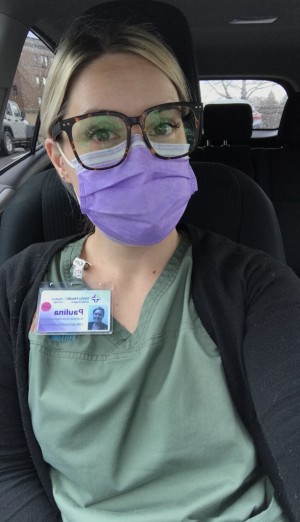
All Hands On Deck Intensifies Hands-on Learning for Public Health Students
In the spring of 2020, as COVID-19 quickly escalated from faraway mystery virus to omnipresent public health emergency, students in Bay Path’s health sciences programs found themselves at a fortuitous moment, when understanding and providing community level healthcare became an urgent and critical call to action.
 For Paulina Matusik G'21, who was studying for her master’s in public health, the pandemic was an impetus to bring her education to community efforts to contain COVID-19 and protect healthcare workers.
For Paulina Matusik G'21, who was studying for her master’s in public health, the pandemic was an impetus to bring her education to community efforts to contain COVID-19 and protect healthcare workers.
At the outset of the pandemic, Matusik had been working in the referrals department of Trinity Health of New England, but as the pandemic pressed the agility and resourcefulness of organizations, it became clear that she had much to offer.
“I was focused on insurance, referring people to doctors and processing referrals, but because of my public health background, Trinity pulled me into a hospital setting,” she explains. “The situation was severe at nursing homes, and I was tasked with coordinating weekly testing with all the practice supervisors and all the employees at all the satellite offices.”
“Because I knew so much, I never really had a break,” Matusik adds. “I worked with nurses, doctors, and medical directors and then, I became certified in N95 mask testing. I wound up doing twelve-hour days, working at hospitals, nursing homes, and Trinity’s affiliated sites to make sure doctors, nurses, and anybody working with COVID patients were fitted with proper Personal Protective Equipment (PPE).”
At the same time, Matusik was also doing her practicum, a supervised practical field experience required for all public health students, at the Chicopee Health Department. The experience put her at the center of the quandary of misinformation that continues to undermine attempts at controlling the virus.
“I would have to call anybody that tested positive, and many of them did not even realize that they had to stay home,” she says. “Despite all the news coverage, they were not knowledgeable about how fast the disease spreads and what symptoms are associated with it. It’s not what I expected in the middle of a global pandemic.”
“So, I worked with the public health director and a public health nurse to educate people about the importance of isolation and the difference between quarantine, which keeps someone who might have been exposed to the virus away from others, and isolation, which requires an infected person to isolate themselves from their own household members.”
Matusik completed the public health master’s program this past May, along with a capstone project, “Efficacy of Contact Tracing for the Containment of COVID-19,” which looked at local public health departments’ efforts to rapidly locate positive cases and persuade them to participate in further investigation to prevent spread. In addition to completing her degree, she began a new position as a supervisor at Trinity, a career path she never would have imagined taking in a pre-pandemic world.
“Seeing everything that I’ve seen this year most definitely pushed me to realize my capabilities and the ways I can contribute to public health and communities. It brought me out of my comfort zone,” she reflects. “After dealing with so many different people, supervisors, and communities, I’m now in charge of supervising three different departments. COVID has been so hard for everyone, and it’s been hard for me, too, but, it’s been a chance to realize what I’m able to do.”
While Health Sciences Students Look Outward, Bay Path’s Health Science Programs Look Inward
As the country struggled to confront and contain COVID-19, the murder of George Floyd brought a deeper sense of reflection—and outrage— to the ways race shapes the realities of different Americans in persistent and unjust ways.
The global reckoning with the fact that Black Americans are five times more likely to be arrested and 2.6 times more likely to be killed by police coincided with data finding that Black and Indigenous populations were dying from COVID-19 at higher rates than whites. The need to engage with the long, hard legacy of American racial injustice gave way to a series of interdisciplinary colloquia and discussions throughout Bay Path’s School of Education, Human and Health Sciences, and eventually the creation of a concentration in public health.
“The pandemic, along with some of the social movements that occurred at the same time over this past summer and this past year, brought up things for people that they wouldn’t otherwise really know about or take the time to consider and understand,” says Dr. Julie Watson, director of Bay Path’s post-professional occupational therapy doctorate, doctorate in health science, and masters of public health programs.
The eagerness of students across all divisions of the School of Education, Human and Health Sciences to participate in discussing diversity, equity, and inclusion issues coincided with ongoing conversations Drs. DeVito and Watson had been having about how their programs could more intentionally address the changes that were reshaping healthcare.
Bay Path launched a public health concentration for students in the doctorate in health sciences program, designed for students who want to integrate public health concepts into their current work or future career. In addition, Dr. DeVito spearheaded a series of conversations for all health science students and faculty to discuss the issues at hand.
“Bringing everyone together for these conversations really showed that we can do things more efficiently,” Dr. Watson says.


